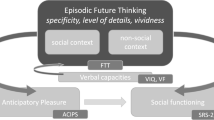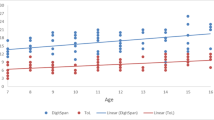Abstract
To investigate the early development of episodic memory and future thinking in autism spectrum disorder (ASD), we selected 94 participants each from a group of ASD and typically developing (TD) preschoolers. They were required to remember newly-acquired knowledge sources and anticipate action timings necessary for future events. Five-year-old children with ASD remembered their knowledge sources similar to TD children; however, the 6-year-old children performed more poorly than their TD counterparts. ASD children failed to anticipate future action timings in comparison with TD children. Although source memory and future thinking were related in TD children, they were unrelated in children with ASD. The results suggest that episodic memory and foresight are deficient and unintegrated in ASD children during the preschool years.
Similar content being viewed by others
References
American Psychiatric Association. (1994). Diagnostic and statistical manual of mental disorders, 4th ed.; DSM-IV. Washington: American Psychiatric Association.
American Psychiatric Association. (2013). Diagnostic and statistical manual of mental disorders: DSM-5 (5th ed.). Arlington, VA: American Psychiatric Association.
Atance, C. (2015). Young children’s thinking about the future. Child Development Perspectives,9, 178–182.
Atance, C., & O’Neill, D. K. (2001). Episodic future thinking. Trends in Cognitive Sciences,5, 533–539.
Bennetto, L., Pennington, B. F., & Rogers, S. J. (1996). Intact and impaired memory function in autism. Child Development,67, 1816–1835.
Beversdorf, D. Q., Anderson, J. M., Manning, S. E., Anderson, S. L., Nordgren, R. E., Felopulos, G. J., et al. (1998). The effect of semantic and emotional context on written recall for verbal language in high functioning adults with autism spectrum disorder. Journal of Neurology, Neurosurgery and Psychiatry,65, 685–692.
Boucher, J., & Bowler, D. (Eds.). (2008). Memory in autism: Theory and evidence. Cambridge: Cambridge University Press.
Boucher, J., Pons, F., Lind, S., & Williams, D. (2007). Temporal cognition in children with autistic spectrum disorder: Tests of diachronic thinking. Journal of Autism and Developmental Disorders,37, 1413–1429.
Bowler, D. M., Gardiner, J. M., & Grice, S. J. (2000). Episodic memory and remembering in adults with Asperger syndrome. Journal of Autism and Developmental Disorders,30, 295–304.
Bruck, M., London, K., Landa, R., & Goodman, J. (2007). Autobiographical memory and suggestibility in children with autism spectrum disorder. Development and Psychopathology,19, 73–95.
Busby Grant, J., & Suddendorf, T. (2010). Production of temporal terms by 3-, 4-, and 5-year-old children. Early Childhood Research Quarterly,26, 87–95.
Coolican, J., Bryson, S. E., & Zwaigenbaum, L. (2008). Data on the Stanford-Binet intelligence scales (5th ed.) in children with autism spectrum disorder. Journal of Autism and Developmental Disorders,38, 190–197.
Crane, L., & Goddard, L. (2008). Episodic and semantic autobiographical memory in adults with autism spectrum disorders. Journal of Autism and Developmental Disorders,38, 498–506.
Dawson, M., Soulières, I., Gernsbacher, M. A., & Mottron, L. (2007). The level and nature of autistic intelligence. Psychological Science,18, 657–662.
Drummey, A. B., & Newcombe, N. S. (2002). Developmental changes in source memory. Developmental Science,5, 502–513.
Facon, B., Magis, D., Nuchadee, M.-L., & De Boeck, P. (2011). Do Raven’s Colored Progressive Matrices function in the same way in typical and clinical populations?: Insights from the intellectual disability field. Intelligence,39, 281–291.
Friedman, W. J. (1992). Children’s time memory: The development of a differentiated past. Cognitive Development,7, 171–187.
Goddard, L., Dritschel, B., Robinson, S., & Howlin, P. (2014). Development of autobiographical memory in children with autism spectrum disorders: Deficits, gains, and predictors of performance. Development and Psychopathology,26, 215–228.
Goddard, L., Howlin, P., Dritschel, B., & Patel, T. (2007). Autobiographical memory and social problem solving in Asperger syndrome. Journal of Autism and Developmental Disorders,37, 291–300.
Gopnik, A., & Graf, P. (1988). Knowing how you know: Young children’s ability to identify and remember the sources of their beliefs. Child Development,59, 1366–1371.
Grondhuis, S. N., Lecavalier, L., Arnold, L. E., Handen, B. L., Scahill, L., McDougle, C. J., et al. (2018). Differences in verbal and nonverbal IQ test scores in children with autism spectrum disorder. Research in Autism Spectrum Disorders,49, 47–55.
Hala, S., Rasmussen, C., & Henderson, A. M. E. (2005). Three types of source monitoring by children with and without autism: The role of executive function. Journal of Autism and Developmental Disorders,35, 75–89.
Hanson, L. K., & Atance, C. M. (2014). Episodic foresight in autism spectrum disorder. Journal of Autism and Developmental Disorders,44, 674–684.
Harner, L. (1975). Yesterday and tomorrow: Development of early understanding of the terms. Developmental Psychology,11, 864–865.
Hayashi, M., Kato, M., Igarashi, K., & Kashima, H. (2008). Superior fluid intelligence in children with Asperger’s disorder. Brain and Cognition,66, 306–310.
Henderson, H. A., Zahka, N. E., Kojkowki, N. M., Inge, A. P., Schwartz, C. B., Hileman, C. M., et al. (2009). Self-referenced memory, social cognition, and symptom presentation in autism. Journal of Child Psychology and Psychiatry,50, 853–861.
Hudson, J. A., Meyhew, E. M. Y., & Prabhakar, J. (2011). The development of episodic foresight: Emerging concepts and methods. In J. B. Benson (Ed.), Advances in Child Development and Behavior (pp. 95–137). Amsterdam: Elsevier.
Kamio, Y., & Toichi, M. (2007). Memory illustion in high-functioning autism and Asperger’s Disorder. Journal of Autism and Developmental Disorders,37, 867–876.
Klein, S. B. (2016). Autonoetic consciousness: Reconsidering the role of episodic memory in future-oriented self-projection. The Quarterly Journal of Experimental Psychology,69, 381–401.
Koyama, T., & Kurita, H. (2008). Cognitive profile difference between normally intelligent children with Asperger’s disorder and those with pervasive developmental disorder not otherwise specified. Psychiatry and Clinical Neurosciences,62, 691–696.
Lind, S. E., & Bowler, D. M. (2008). Episodic memory and autonoetic consciousness in autistic spectrum disorders: The role of self-awareness, representational abilities and temporal cognition. In J. Boucher & D. Bowler (Eds.), Memory in autism: Theory and evidence (pp. 166–187). Cambridge: Cambridge University Press.
Lind, S. E., & Bowler, D. M. (2009). Recognition memory, self-other source memory, and theory of mind in children with autism spectrum disorder. Journal of Autism and Developmental Disorders,39, 1231–1239.
Lind, S. E., & Bowler, D. M. (2010). Episodic memory and episodic future thinking in adults with autism. Journal of Abnormal Psychology,119, 896–905.
Lind, S. E., Williams, D. M., Bowler, D. M., & Peel, A. (2014). Episodic memory and episodic future thinking impairments in high-functioning autism spectrum disorder: An underlying difficulty with scene construction or self-projection? Neuropsychology,28, 55–67.
Marini, A., Ferretti, F., Chiera, A., Magni, R., Adornetti, I., Nicchiarelli, S., et al. (2016). Self-based and mechanical-based future thinking in children with autism spectrum disorder. Journal of Autism and Developmental Disorders,46, 3353–3360.
McCormack, T., & Hoerl, C. (1999). Memory and temporal perspective: The role of temporal frameworks in memory development. Developmental Review,19, 154–182.
McCormack, T., & Hoerl, C. (2001). The child in time: Temporal concepts and self-consciousness in the development of episodic memory. In C. Moore & K. Lemmon (Eds.), The self in time: Developmental perspectives (pp. 203–227). Mahwah, NJ: Lawrence Erlbaum Associates.
McCrory, E., Henry., L. A., & Happé, F. (2007). Eye-witness memory and suggestibility in children with Asperger syndrome. Journal of Child Psychology and Psychiatry,48, 482–489.
Millward, C., Powell, S., Messer, D., & Jordan, R. (2000). Recall for self and other in autism: Children’s memory for events experienced by themselves and their peers. Journal of Autism and Developmental Disorders,30, 15–28.
Naito, M. (2003). The relationship between theory of mind and episodic memory: Evidence for the development of autonoetic consciousness. Journal of Experimental Child Psychology,85, 312–336.
Naito, M., & Suzuki, T. (2011). “When did I learn and when shall I act?”: The developmental relationship between episodic future thinking and memory. Journal of Experimental Child Psychology,109, 397–411.
Neisser, U. (1988). Five kinds of self-knowledge. Philosophical Psychology,1, 35–59.
O’Shea, A. G., Fein, D. A., Cillessen, A. H. N., Klin, A., & Schultz, R. T. (2005). Source memory in children with autism spectrum disorders. Developmental Neuropsychology,27, 337–360.
Renner, R., Klinger, L. G., & Klinger, M. R. (2000). Implicit and explicit memory in autism: Is autism an amnesic disorder? Journal of Autism and Developmental Disorders,30, 3–14.
Schacter, D. L., & Addis, D. R. (2008). The cognitive neuroscience of constructive memory: Remembering the past and imagining the future. In I. Driver, P. Haggard, & T. Shallice (Eds.), Mental processes in the human brain (pp. 27–47). New York: Oxford University Press.
Soulières, I., Dawson, M., Gernsbacher, M. A., & Mottron, L. (2011). The level and nature of autistic intelligence. II: What about Asperger syndrome? PLoS ONE,6, e25372.
Suddendorf, T. (2010). Linking yesterday and tomorrow: Preschoolers’ ability to report temporally displaced events. British Journal of Developmental Psychology,28, 491–498.
Suddendorf, T. (2016). Episodic memory versus episodic foresight: Similarities and differences. WIREs Cognitive Science,1, 99–107.
Suddendorf, T., & Corballis, M. C. (1997). Mental time travel and the evolution of the human mind. Genetic, Social, and General Psychology Monographs,123, 133–167.
Suddendorf, T., Nielsen, M., & von Gehlen, R. (2011). Children’s capacity to remember a novel problem and to secure its future solution. Developmental Science,14, 26–33.
Sugishita, M., & Yamazaki, K. (1993). Japanese Raven’s Coloured Progressive Matrices. Tokyo: Nihon Bunka Kagaku-sha.
Tanweer, T., Rathbone, C. J., & Souchay, C. (2010). Autobiographical memory, autonoetic consciousness, and identity in Asperger syndrome. Neuropsychologia,48, 900–908.
Taylor, M., Esbensen, B. M., & Bennett, R. T. (1994). Children’s understanding of knowledge acquisition: The tendency for children to report that they have always known what they have just learned. Child Development,65, 1581–1604.
Terrett, G., Rendell, P. G., Raponi-Sauders, S., Henry, J. D., Bailey, P. E., & Altgassen, M. (2013). Episodic future thinking in children with autism spectrum disorder. Journal of Autism and Developmental Disorders,43, 2558–2568.
Toichi, M. (2008). Episodic memory, semantic memory and self-awareness in high-functioning autism. In J. Boucher & D. Bowler (Eds.), Memory in autism: Theory and evidence (pp. 143–165). Cambridge: Cambridge University Press.
Toichi, M., Kamio, Y., Okada, T., Sakihama, M., Youngstrom, E. A., Findling, R. L., et al. (2002). A lack of self-consciousness in autism. American Journal of Psychiatry,159, 1422–1424.
Tulving, E. (1985). Memory and consciousness. Canadian Psychology,26, 1–11.
Tulving, E. (2005). Episodic memory and autonoesis: Uniquely human? In H. S. Terrace & J. Metcalfe (Eds.), The missing link in cognition: Origins of self-reflective consciousness (pp. 3–56). New York: Oxford University Press.
Ueno, K., Nagoshi, S., & Konuki, S. (2008). The picture vocabulary test-revised. Tokyo: Nihon Bunka Kagaku-sha.
Yoshimura, S., & Toichi, M. (2014). A lack of self-consciousness in Asperger’s disorder but not in PDDNOS: Implication for the clinical importance of ASD subtypes. Research in Autism Spectrum Disorders,8, 237–243.
Acknowledgments
The study was supported by the Organization for Promoting Neurodevelopmental Disorder Research. We are grateful to Remi Kosaka, Minori Nakamura, Seiko Nabatame, Eriko Gavinio for their help in data collection, and to Drs. Noriko Kimura and Sayaka Yoshimura for diagnosing children with ASD. We also thank the children, teachers, and principals at the nursery and primary schools in Yasu, Shiga, and Sakai, Osaka, Japan, for their cooperation.
Author information
Authors and Affiliations
Corresponding author
Ethics declarations
Conflict of Interest
Authors declare no conflict of interest.
Ethical Approval
All study components received the approval of the university’s Institutional Review Board.
Informed Consent
The parents of all children released their informed consent for their children’s participation in the study and to the treatment of the data.
Additional information
Publisher's Note
Springer Nature remains neutral with regard to jurisdictional claims in published maps and institutional affiliations.
Rights and permissions
About this article
Cite this article
Naito, M., Hotta, C. & Toichi, M. Development of Episodic Memory and Foresight in High-Functioning Preschoolers with ASD. J Autism Dev Disord 50, 529–539 (2020). https://doi.org/10.1007/s10803-019-04274-9
Published:
Issue Date:
DOI: https://doi.org/10.1007/s10803-019-04274-9




